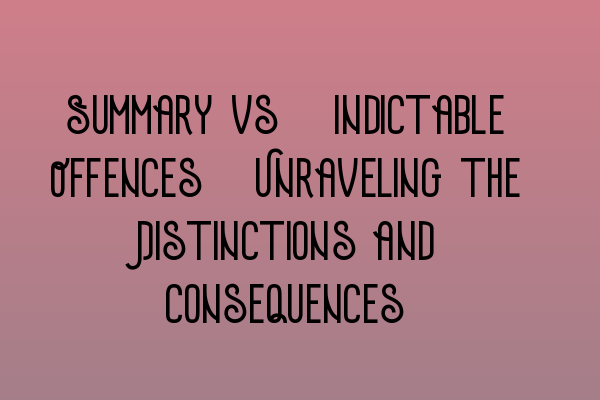Summary vs. Indictable Offences: Unraveling the Distinctions and Consequences
When it comes to criminal law in the UK, there are two main classifications of offences: summary offences and indictable offences. Understanding the differences between these two categories is crucial for both legal professionals and individuals facing criminal charges. In this article, we will explore the distinctions and consequences of summary and indictable offences, providing you with essential knowledge to navigate the intricacies of the legal system.
Summary Offences
Summary offences, also known as minor offences, are typically less serious crimes that are tried in the Magistrates’ Court. These offences are usually prosecuted by the Crown Prosecution Service (CPS) and do not involve a jury. Examples of summary offences include common assault, criminal damage, and low-level theft.
One crucial characteristic of summary offences is that they carry less severe penalties compared to indictable offences. Convictions for summary offences may result in fines, community service, or short-term imprisonment. However, it’s important to note that the exact punishment can vary depending on the specific offence and circumstances of the case.
If you are studying for the SQE 1 exam, it is essential to have a solid understanding of summary offences. To test your knowledge, you can take practice exam questions available here.
Indictable Offences
Unlike summary offences, indictable offences are more serious crimes that are typically heard in the Crown Court. These offences carry potentially severe penalties, including long-term imprisonment. Indictable offences are often prosecuted by the CPS or the Serious Fraud Office.
There are three categories of indictable offences: indictable only offences, hybrid offences, and either-way offences.
- Indictable Only Offences: These offences can only be tried in the Crown Court. Examples include murder, rape, and drug trafficking. The severity of these offences warrants the involvement of a jury and the potential for lengthy prison sentences.
- Hybrid Offences: As the name suggests, hybrid offences can be tried either in the Magistrates’ Court or the Crown Court, depending on the seriousness of the case. Examples of hybrid offences include theft over a certain value, possession of a controlled substance with intent to supply, and certain types of assault.
- Either-Way Offences: Either-way offences have an intermediate level of seriousness, allowing the CPS to choose whether to prosecute in the Magistrates’ Court or the Crown Court. The decision is based on factors such as the defendant’s criminal record, the complexity of the case, and the potential sentence. Examples of either-way offences include burglary, fraud, and serious assault.
If you are preparing for the SQE 2 exam, it is crucial to have a deep understanding of indictable offences. To enhance your knowledge and improve your performance, consider enrolling in SQE 2 preparation courses, which you can find here.
Consequences
The consequences of summary and indictable offences extend beyond the immediate punishments imposed by the court. Criminal convictions, regardless of the offence type, can have a long-lasting impact on a person’s personal and professional life.
Having a criminal record may affect employment prospects, professional licenses, and visa applications. Additionally, it can lead to social stigma, strained relationships, and limited access to certain opportunities.
If you need further guidance on navigating the consequences of criminal convictions or require legal advice regarding your specific situation, do not hesitate to consult with a criminal law solicitor. They can provide tailored advice and representation to help you achieve the best possible outcome in your case.
To stay up-to-date with the latest SRA SQE exam dates, visit our article here.
In conclusion, understanding the distinctions and consequences of summary and indictable offences plays a crucial role in criminal law practice. Whether you are a legal professional, a law student preparing for the SQE exams, or an individual navigating the legal system, possessing this knowledge will strengthen your understanding and decision-making. Remember to seek professional advice and resources whenever necessary to ensure the best possible outcome in legal proceedings.
